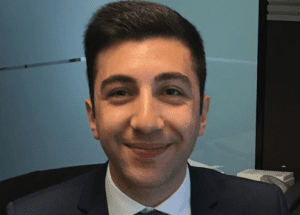Four Hogan Lovells trainees share with us their own, different insights into a Hogan Lovells training contract and what advice they’d give to applicants – read below!
Stand out on the Watson Glaser test with our useful tips and strategies.
Go to the Watson Glaser Guide
Top Tips from Trainee Mounir Haddad
Hogan Lovells trainee Mounir gives his top tips for navigating the training contract application process…
- Use your university’s careers office: They are a great ally and will help you prepare for interviews, proofread your application.
- Practice: I cannot stress enough the importance of practising as much as possible for training contract interviews, online tests and group exercises. The internet is full of help so make use of everything you can find.
- Don’t underestimate your non-legal work experiences: You are likely to have picked up important skills such as teamwork, resilience so don’t be hesitant to talk about them in your application answers and interviews. These are vital for every lawyer and will help you show off your competencies.
- Always be yourself: Your personality and differences are your strengths. Being yourself will help both you and Hogan Lovells find out if you are a good fit.
- Be inquisitive and ask questions: Hogan Lovells loves people who want to find out more about the firm so don’t be afraid to ask.

Why Hogan Lovells? With Helen Poulson
“I now have a greater appreciation of how we weave these different types of legal work together to make a whole.”
For me, what sets Hogan Lovells apart is the people. When the pressure’s on there’s a real sense of the team pulling together. My intake is a diverse group of people, around half are from a non-law background. Everyone takes pride in their work, but without losing their sense of fun. There is a real commitment to pro-bono and citizenship work, which is evident in every part of the firm.
Different practice areas have different ways of working. In International Arbitration it’s very collaborative, where you often work in smaller teams. It’s very common for lawyers to pop in and out of each other’s offices to discuss certain points.
Before I joined Hogan Lovells, the law was more of an academic concept to me. Now I see it as a toolkit that we use to fix our clients’ problems, and we don’t use just one tool at a time! In International Arbitration, we must gather relevant facts from witnesses, construct legal arguments, stay focused to the procedural aspects that arise and respond to what the other side is doing. I now have a greater appreciation of how we weave these different types of legal work together to make a whole.
I’ve also learned that different industries have their own internal practices and standards, and it’s our job to recognise and understand them. There’s no point giving a business advice if that advice is incompatible on a practical level with the way the business operates.
I learned quite a bit about business on my induction. All trainees take part in the Hogan Lovells BaSE programme, which teaches you about business basics and what’s behind client decision-making. We were split into small teams and each team was given a client to advise over six months. I gained invaluable experience of managing the client relationship and the overall matter.
Though I’m only in my first seat, I’ve managed to have not one, but two brilliant supervisors who’ve both been very supportive. It’s inevitable that the experienced people you work with are going to have a big impact on your career which is why (in my opinion) a Hogan Lovells training contract is among the best!

My Hogan Lovells Training Contract Journey So Far: Amy Harding
“We’re encouraged to keep on top of legal and regulatory developments which affect our practice.”
It’s difficult to sum up the people who work at Hogan Lovells – we’re all so different. On the whole, the main thing to say is that the people you’ll meet at the firm are intelligent, driven and encouraging: they work hard but will always make the time to offer advice if you need it.
For me, the most memorable piece of advice I’ve had was actually on my vacation scheme here. We attended a commercial awareness workshop with Christopher Stoakes, who – as well as having worked for Hogan Lovells and other London firms – has also written brilliant books on how to understand the workings of the City. Prior to his training session, the concept of ‘commercial awareness’ was quite abstract to me, so this was the first time I really understood the concept and its importance for a City lawyer.
My legal knowledge has come so far since starting at the firm, from the first day through to qualification. We’re encouraged to keep on top of legal and regulatory developments which affect our practice. We learn to set specific, attainable goals in our learning and manage our time to achieve them. And of course, we attend monthly training sessions where both internal and external speakers present on topical issues.
Since joining, I’ve definitely grown in confidence. One part of the job I particularly enjoy is being part of strategic discussions with a view to getting the best results for our clients. Even at a junior level, I feel like my contributions are valued in these discussions, thanks to the support of my colleagues. I’m also now responsible for some of the monthly case updates which I present at our group meetings.

Why Culture Matters, with Ariane Messiter
“Understanding businesses is crucial to a commercial solicitor’s day-to-day life.”
When you do a law degree, you learn the academic side of law. During your training contract you begin to understand how the law works in a commercial context – and what strikes me now is how much I’ve learned about the commercial world.
My first seat was in Real Estate, I learned how property companies and developers attract tenants to lease innovative retail and office spaces (like the Walkie Talkie building). Now, in Restructuring and Insolvency, I’m discovering how external and internal factors can affect the financial health of a business and even whole sectors.
I’m starting to appreciate the way businesses work, how they respond to challenging economic situations and how they innovate to stay at the top of their market. Understanding businesses is crucial to a commercial solicitor’s day-to-day life.
Our open door policy means that solicitors at different levels work closely with each other and I’ve learned a lot from the people all around me. In my first seat, I had a truly inspirational supervisor who took time to train me and other members of the team. As well as being a fantastic support to us, she was also an incredible lawyer who managed to balance a challenging job alongside being a parent. I currently sit with a partner and am able to ask him questions and learn from him directly without feeling I should be going through someone else. Learning from those at the top of their field is a big advantage of working here.
Working with international colleagues has also taught me a lot. In addition to learning international law, I’m developing my organisational skills – especially when the London office is managing the transaction. On a recent deal, I had to identify which international counsel needed to be consulted, lead the line of questioning and managed the responses. It was great fun!
That international collaboration makes us feel very much like one firm. I’ve liaised with colleagues in our international offices quite a few times and found them responsive and cooperative, just like my colleagues in London.
There are many things that set Hogan Lovells training contracts apart from other firms. A key one for me is the variety of client secondments. As a trainee, it’s a great opportunity to develop professionally, and we offer a wide variety covering all practice areas.
My advice to those about to start a training contract would be to get stuck in. The more you do, the more you learn – and the more you grow in confidence.
